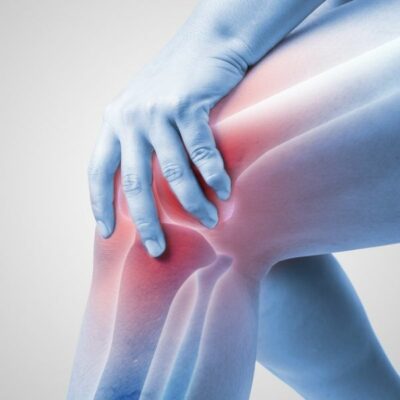Knee Arthritis Specialist

Are you experiencing pain and stiffness in you knees? If so, you may have arthritis in your knees. Knee arthritis develops over time and symptoms can increase as the condition progresses. Knee arthritis specialist, Dr. James Mazzara provides diagnosis and both surgical and nonsurgical treatment options for patients in Manchester, South Windsor, Enfield, Glastonbury and surrounding Hartford communities who have developed knee arthritis. Contact Dr. Mazzara’s team today!
What is Focal Arthritic Change of the Knee?
Focal means a disease which is limited to one specific area. Focal arthritic change of the knee refers to a specific area of cartilage that was injured in the knee and has subsequently caused damage to what was once a normal joint surface. The damage has resulted in arthritis, a debilitating condition that affects thousands of people every day. A focal arthritic change of the knee can lead to pain and a decrease of normal range of motion and function. Dr. James Mazzara, knee specialist serving Manchester, South Windsor, Enfield, Glastonbury and surrounding Hartford communities has extensive experience in treating patients who have a focal arthritic change of the knee.
What Causes Arthritis of the Knee?
Knee arthritis involves damage to the cartilage on the end of the bones. Cartilage is the rubbery, white substance that helps the bones glide painlessly together. Osteoarthritis is the most common form of arthritis in the knee and is due to trauma, age related wear and tear and obesity. It is a slow, progressive degenerative disease where the joint cartilage wears away, leaving the bones without protection and, overtime, may lead to complete cartilage loss where there is bone rubbing directly on bone. Osteoarthritis is typically seen in middle-aged and older patients but can sometimes be seen in younger patients who have had part of their meniscus removed from a previous tear.
Not all arthritis is due to wear and tear. Post traumatic arthritis is due to an injury of the joint and cartilage which leads to the progressive breakdown of the cartilage as a result of either a single injury or multiple repetitive injuries over time. This type of arthritis is similar to knee osteoarthritis and can be seen years after a fracture, ligament tear or meniscus injury. Many of these injuries are in small, localized areas of the knee, which makes potential treatments easier to perform and often, more successful than when there is arthritis in larger areas of the knee.
What are Symptoms of Focal Arthritic Changes to the Knee?
- Pain in the knee
- A dull ache or soreness
- Stiffness in the knee joint
- Constant joint achiness in the knee
- Swelling – can be with or without activity
How is Focal Arthritic Change of the Knee Diagnosed?
Dr. Mazzara will consider the patient’s symptoms and perform a thorough physical exam to check for swollen joints, loss of motion and areas of pain. A patient history, complete with prior injuries and surgeries will help in determining if the patient has arthritis in the knee. Dr. Mazzara can often diagnose arthritic changes of the knee with the use of an x-ray or MRI where changes can be seen in the joint.
How is an Arthritic Change in the Knee Treated?
The exact location of arthritis needs to be assessed when treating arthritic changes in the knee. Knee osteoarthritis on the lower extremity of the femur (thigh bone) is easier to treat than on the top of the femur, where the patella (knee bone) rests, or in the area where the femur and tibia meet. Size of the arthritic lesion is also an important factor, as smaller areas are easier to treat than larger lesions.
Does an Arthritic Change in the Knee Require Surgery?
Patients with mild cases of arthritic change, or osteoarthritis can initially achieve good results by taking a non-steroidal anti-inflammatory medications (NSAIDs.) Curcumin, a substance in turmeric, may help reduce inflammation. Some studies suggest that it might ease symptoms of osteoarthritis and rheumatoid arthritis, like pain and inflammation. For some patients, Dr. Mazzara can administer a corticosteroid injection to reduce pain and inflammation.
How to Treat Arthritic Changes in the Knee with Surgery
Depending on the patient’s age, area of knee arthritis and anticipated outcome, Dr. Mazzara may suggest a few different surgical options. Some of these include:
- For smaller lesions.
- Osteochondral autograft transplants (OATS): takes healthier cartilage from a lesser weight bearing area of the knee and transfers it to the affected area.
- Osteoarticular allografts: For failed microfracture surgeries and larger lesions.
- Partial knee replacement may be appropriate in certain circumstances. Dr. Mazzara is certified in computer navigated MAKO partial and total knee replacements.
If you have questions about treatment options for focal arthritic change of the knee or osteoarthritis of the knee, please contact the orthopedic offices of Dr. James Mazzara, orthopedic knee specialist in Manchester, South Windsor, Enfield, Glastonbury and surrounding Hartford communities.
